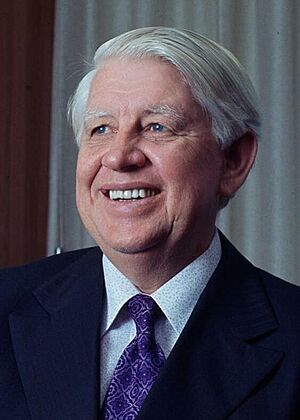Gordon Bryant facts for kids
Quick facts for kids
Gordon Bryant
|
|
|---|---|

Bryant in 1973
|
|
| Minister for the Capital Territory | |
| In office 9 October 1973 – 11 November 1975 |
|
| Prime Minister | Gough Whitlam |
| Preceded by | Kep Enderby |
| Succeeded by | Reg Withers |
| Minister for Aboriginal Affairs | |
| In office 19 December 1972 – 9 October 1973 |
|
| Prime Minister | Gough Whitlam |
| Preceded by | Peter Howson (Environment, Aborigines and the Arts) |
| Succeeded by | Jim Cavanagh |
| Member of the Australian Parliament for Wills |
|
| In office 10 December 1955 – 19 September 1980 |
|
| Preceded by | Bill Bryson |
| Succeeded by | Bob Hawke |
| Personal details | |
| Born | 3 August 1914 Lismore, Victoria, Australia |
| Died | 14 January 1991 (aged 76) Heidelberg, Victoria, Australia |
| Political party | Labor |
| Spouse | Pat |
| Alma mater | University of Melbourne |
| Occupation | Teacher |
Gordon Munro Bryant (born August 3, 1914 – died January 14, 1991) was an important Australian politician. He was a member of the Australian Labor Party (ALP). He represented the area of Wills in Victoria from 1955 to 1980. He served as a minister in the government led by Gough Whitlam. This included being the Minister for Aboriginal Affairs (1972–1973) and the Minister for the Capital Territory (1973–1975).
Contents
Gordon Bryant's Early Life
Gordon Bryant was born on August 3, 1914, in Lismore, Victoria. His parents were Agnes Keith and Donald Munro Bryant. His father was a storekeeper and farmer. Gordon's great-uncle was James Munro, who was a premier of Victoria.
As a child, Gordon moved to Baxter. He went to Frankston High School. He earned a scholarship to become a teacher. He taught in several places, including Callaghan Creek, Pearcedale, and Mittyack. His teaching career was put on hold during World War II. After the war, he became a high school teacher at Upwey. He also studied at Melbourne Teachers' College before the war. In 1950, he earned a Bachelor of Arts degree with honours from the University of Melbourne.
Military Service During World War II
Gordon Bryant joined the Citizen Military Force in 1934. This was a part-time military group. In 1942, he was called up for full-time duty. He then joined the Australian Imperial Force (AIF) in January 1943. The AIF was Australia's main fighting force during the war.
He stayed in Australia until 1945. Then, he took part in the Battle of Balikpapan. This was an important battle in the Pacific. He served as a captain in the 2/33rd Battalion.
Gordon Bryant's Political Career
Gordon Bryant was elected to the Australian Parliament in 1955. He was a strong supporter of Aboriginal land rights. He led the Aborigines Advancement League for seven years, from 1957 to 1964. This group worked to improve the lives of Aboriginal people.
After being in Parliament for 17 years, Bryant joined the Cabinet. The Cabinet is a group of senior ministers who advise the Prime Minister. He became the Minister for Aboriginal Affairs in 1972 under Prime Minister Gough Whitlam. A year later, he became the Minister for the Capital Territory.
As Minister for Aboriginal Affairs, Gordon Bryant played a key role in a historic land rights agreement. This deal was made between the Whitlam government and Vincent Lingiari and the Gurindji people. This was a very important step for Indigenous land rights in Australia.
Bryant retired from Parliament in 1980. His seat was then taken by Bob Hawke, who later became Prime Minister.
Personal Life
Gordon Bryant was married and had two sons. He passed away in January 1991.

